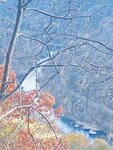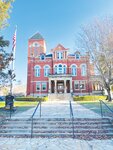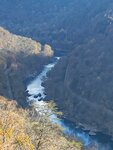






First in a two-part series
FAYETTEVILLE, WEST VIRGINIA — New River Gorge became the nation’s second national river in 1978, its’ designation following the country’s first national river established in 1972: Arkansas’ Buffalo National River.
In December 2020, Congress re-designated New River Gorge National River to a national park and preserve, the only place in the country to have the combined distinction.
A coalition and business group in Arkansas have touted it as a model for re-designating public land around the Buffalo National River as a “national park preserve.”
In June 2022, the Runway Group, LLC, owned by brothers Steuart and Tom Walton, grandsons of Walmart founders Helen and Sam Walton and heirs to the Walmart fortune, quietly approached U.S. Rep. Bruce Westerman, R-Ark., who represents Arkansas’ 4th Congressional District and chairs the House Natural Resources Committee, with the idea of re-designation.
The Runway Group is also a part of the Coalition for the Future of the Buffalo River National Park Preserve, who claims re-designating lands would make the “area the most active-use National Park in the country for outdoor recreation.”
The Record traveled to Fayetteville, W. Va., and interviewed elected officials, business owners, national park service employees, service-industry workers, Realtors, and vacation property managers to find out how re-designating the New River Gorge has changed the area and their way of life.
A town with a population of approximately 2,800, according to the U.S. Census, Fayetteville, W. Va. is the town closest to the new park and preserve. The town square and county courthouse anchor the downtown area. It has a mayor, town council, town manager, a visitors center, and convention and visitors bureau and other parks visited by people from all over the world for outdoor recreation.
Three hotels, more than 100 vacation rentals and private and public campgrounds provide tourists a place to stay. The square and downtown boast locally owned restaurants.
U.S. Route 19, a four-lane highway, runs through the town and leads to several larger gateway communities.
Wendy Bayes, a Realtor and owner of a favorite local restaurant, Cathedral Cafe in downtown Fayetteville, moved to the area in 1994.
“There’s a fine line between the ‘from here’s’ and ‘the not-from-here’s.’ And by having a local cafe and raising my kids in the area, I’ve gotten very lucky to be embraced,” Bayes said.
The re-designation of New River Gorge to a national park and preserve changed the community. It boosted tourism by 30 to 35%, increased business by at least the same figures and prompted local and outside investors to buy and renovate properties and build hotels and apartments. Vacation rentals have increased, money is being pumped into the local economy, and private campgrounds are popping up. Locals are happy that lands they grew up on are protected from being developed by the park designation.
They are prideful of their area and community, touting the landscape and the kind-hearted and friendly people. They noted their distaste for a hillbilly reputation.
Even with the positive economic indicators brought by the re-designation, people disagreed on whether the change, coupled with the increase in outdoor recreation during Covid, have been good for their community.
“I feel there’s a huge animosity between locals non-willing to change and a person, like myself,” who embraces growth and is an outdoor-recreation enthusiast, said Fayetteville town councilman Brian Good, who manages the city parks and some private vacation rentals.
But they all agreed the current infrastructure is lacking, housing and lodging are in short supply, eating in their favorite restaurants can be problematic, property values and taxes have increased, parking “is horrible” and traffic is congested, and the school system continues to rank near the bottom of the state’s school districts.
Even though the area saw tourism explode in 2020 due to people getting outside during Covid, some locals think the re-designation happened too fast and the area was unprepared.
“We were on a 20-year plan and it got pushed to a two-year plan,” Bayes said.
Local business owner, Andy Forron, owner of New River Bikes, advised people around the Buffalo to “brace for impact,” if the land was to be re-designated.
Mayor Sharon Cruikshank says she’s “happy but not satisfied” and would have preferred “a little more support with infrastructure, parking, signage from the National Park Service,” but realizes it is “strapped as well.”
Town Manager Matt Diederich doesn’t see a lot of cons, but, “Some of the locals want it to be a quiet town and it’s not a quiet town anymore.”
Larry Nibert’s business, West Virginia Experience, a fishing and hunting guide service, has experienced an increase in calls, but “with a lot more business comes a lot more traffic, comes a lot more stress and a lot more headaches.”
Nibert said locals are not happy with the change. “When you talk to people, ask them if they’re local or are they an implant. I think you’ll find the implants are less opposed than the locals who run businesses.”
Lizzie Watts, who was park superintendent when New River Gorge became a national park and preserve, said some “really good things” come from re-designation but the process has to be handled well.
Watts, who worked for the NPS for 45 years, said its’ mission is to “preserve and protect the park’s resources, our American history, our stories, our culture for the next generation. As long as we’re true to that, even making good money, it’s not a bad thing if it’s done the right way for the business side of things.
“But for all the ranchers and farmers that live on that river, your stories are just as important. Their way of life has been farming the pastures and their way of passing that down to the next generation has to be honored,” Watts said.
Park and Preserve Designation
Talk began of turning the New River Gorge area into a national park when it was designated a national river, but those plans stalled because of hunters’ opposition.
The prospect resurfaced around 2018.
Re-designating the land “was driven by locals, convention bureaus, local tourism boards, people who were looking to benefit from the economic benefits of having a national park,” according to Dave Bieri, district supervisor for interpretation at New River Gorge Park and Preserve.
Rafting companies pushed for the re-designation, according to Becky Sullivan, director of the New River Gorge Convention and Visitors Bureau. Some of the concessionaires hired lobbyists to push the change.
They wanted to attract more visitors, spur economic activity and increase tax revenue for infrastructure, and they had the support of West Virginia’s U.S. Senators, Joe Manchin III, a Democrat, and Shelley Moore Capito, a Republican.
Manchin and Capito “wanted to see it happen really bad, so they just kept pursuing it,” Sullivan said. “Being a national park state, they knew what it would do for the area bringing in tourism, bringing in the people, and increasing a positive awareness for the state.”
The process took about two years.
To become a national park, the U.S. Secretary of Interior must value the area for its national significance and stories it can tell. The New River Gorge National Park and Preserve tells the stories of the area’s geology, coal mining, railroading, logging and natural resources, Watts said.
Manchin and Capito held town hall meetings, in which quizzical, concerned and angry citizens asked questions and voiced frustrations.
Watts testified on Capitol Hill before the Senate Natural Resources Committee and again when that committee came to Beckley, W. Va., a larger town, 22 miles from Fayetteville.
“They don’t do that very often, have a meeting outside of D.C.,” Watts said.
But Manchin and Capito wanted to hear from local citizens.
“They wanted their side of the story,” Watts said. “How did they feel? What were their concerns? Anything they wanted to ask was put on the record.”
Conversations about the change “became heated quite often,” Watts said.
Bayes said most attending were opposed. “Others were just like, ‘Yeah, ok, let’s go.’”
Nibert attended the meetings, saying, “It was pretty obvious to me from the get-go that there were certain local monies who were going to benefit a lot more than small businesses like mine.”
The prevalent concern was taking away hunting rights.
“Property values were a concern but hunting was a huge issue because hunters didn’t want to lose the property that they’ve hunted on for years and years and years,” Sullivan said.
Distinctions exist between a national park, a national preserve and a national reserve.
A national park is the highest of all statuses, bringing in far more tourists, but also restricting hunting and fishing rights. “It must be found to be nationally unique and significant enough to become a national park instead of a river,” Watts said.
A national preserve may allow hunting and fishing rights, oil and gas exploration and mineral extractions and the re-designation is easier to achieve.
“A preserve allows the community to do what has always been done,” Watts said.
A national reserve has even less restrictions, continuing to allow hunting, fishing, and oil and gas exploration and mineral extractions and allows the land management to be turned over to a state.
In December 2020, a time when the area was still experiencing an influx of visitors due to Covid, a clause in the back of a Covid relief bill made some land around New River Gorge a national park and other lands a preserve, expanding the area by 3,000 acres and giving hunters rights on the preserve but not in the park.
Buffalo National River Process
The processes used to make the Buffalo River a national one and the prospect of making it a park or preserve or both have differed from those used for New River Gorge’s re-designation.
Before becoming a national river, land ownership around New River Gorge was varied, some lands were privately owned while others were owned by former coal-mining companies. Some owners chose to sell their property. The government did not use eminent domain or condemn any lands while establishing New River Gorge National River.
Lands around the Buffalo River were mostly privately owned. Eminent domain was used to make some land part of the Buffalo National River. Strong feelings about the public taking of private lands remain a source of deep anger and consternation more than 50 years later.
Legislation making the Buffalo River a national one enacted on March 1, 1972, maintained hunting and fishing rights but did not provide rights for mineral extractions or oil and gas exploration.
Confusion surrounds what was being pursued by the Runway Group and the coalition. In some comments, the Runway Group insisted the designation would be only a preserve.
However, in informational “fact sheets” produced by the Runway Group, it used terminology of park and preserve interchangeably, sometimes touting the success of a national park, other times, stating it only intended to seek information on a preserve and at other times stating the “path to action is clear” for turning the land into a “national park preserve.”
The fact sheets’ first page states, “A National Park would preserve the Buffalo River way of life.”
Some people living around the Buffalo National River do not want the land open to gas and oil exploration or mineral extraction.
“The First Gentleman [Bryan Sanders, chair of a state tourism council] does not support nor has he even discussed the idea of drilling or mining in the Buffalo National River,” Gov. Sarah Huckabee Sanders’ spokesperson Alexa Henning said recently in a written statement.
The Runway Group stated through its literature that mineral extraction and oil and gas exploration would be allowed if the land were re-designated as a preserve.
Big money often comes from mineral extractions and oil and gas explorations, Watts said.
Unlike the public meetings about the re-designation at New River Gorge, several actions took place quietly in the 15 months between the Runway Group’s meeting with Westerman and the public learning about the re-designation possibility, including discussions with Gov. Sanders and Westerman and the Runway Group and Bryan Sanders.
In January, Gov. Sanders signed an executive order establishing the 18-member Natural State Advisory Council in an effort to increase the state’s tourism business. She appointed Bryan Sanders as chairman and Tom Walton as a member.
This spring, Bryan Sanders, who spoke alongside Tom Walton, told members of the Rotary Club of Little Rock that he wanted to double the state’s outdoor recreation economy from its current $3.5 billion to $7 billion in the next 10 years. At the same time, Bryan Sanders began contacting state officials about re-designation.
Austin Albers, a member of the Natural State Advisory Council and president and owner of Buffalo Outdoor Center, a concessionaire, reached out to Watts asking about New River Gorge Park and Preserve’s re-designation.
In September, in an effort to gauge public opinion about the potential re-designation, the Runway Group hired Selzer & Co., who polled 412 voters in Baxter, Madison, Marion, Newton and Searcy counties about the proposal. Most of those surveyed indicated they were in favor.
No legislation is currently being written, according to Westerman and Gov. Sanders. After local pushback during a town hall meeting, the Runway Group said they are pulling back and taking no further steps.
“The designation change for the Buffalo National River is not our decision to make, but we believe it’s an idea worth exploring,” a Runway Group statement said.
The coalition took down its website. The Runway Group declined to name coalition members.
Infrastructure
Change came fast to the New River Gorge area.
“We thought we were going to have time to prepare and then all of a sudden, bam, it’s done,” Cruikshank said.
Lack of infrastructure caught everyone off guard when federal funding did not accompany re-designation.
“When I talk infrastructure, I’m talking about roads, the boat ramps, I’m talking the trails. I’m talking the parking,” Nibert said.
Nibert lives within 200 yards of NPS land and near a popular hiking trail. “Any given Friday, Saturday or Sunday, that parking lot is full and people are out there parked along the road. Half the time, their vehicles are parked in the way,” he said.
“We have more parking violations, people parking in handicapped or no-parking or loading zones only,” Cruikshank said.
The towing business increased, Sullivan said.
And people are not accustomed to one-lane dirt roads.
“You definitely want people who know how to drive on a dirt road, rather than trying to go 55, especially in the summer when you’re going to have a nice dust cloud,” Cruikshank said.
Recently, Nibert was driving clients to the river in his 1994 Chevrolet Suburban when he had to slam on the brakes. “Here comes probably 10 sports cars. I’m not talking a Camaro. I’m talking Lamborghinis, Porsches and they’re about to run us in the ditch,” he said.
“They drive like bats out of hell. I’m talking a small percentage of folks, but it goes back to infrastructure. We were not prepared to deal with this, in my opinion.”
Nibert said he’s seen RVs parked on boat ramps and “People sitting out there having coffee because they ain’t got enough sense to realize that’s a boat ramp.”
People think since it’s a national park, they can do whatever they want, he said. “Well, no you can’t. There’s still those of us out there trying to make a living,” Nibert said.
Visitors cause traffic jams by driving at a snail’s pace across the four-lane New River Gorge Bridge, an iconic bridge and one of the most photographed places in West Virginia. Locals know to travel the inside lane and prepare to suddenly stop at times.
Though Nibert said everyone “should get out there to enjoy God’s creation,” he would like to see fewer people on his road.
“There’s too many doggone people going in and out of these roads and using these areas at times and it is, it’s stressful.”
Nibert doubted when Manchin told those attending the meetings not to worry about infrastructure because Manchin was on the appropriations committee and he would just delegate more funds to the area.
Progress is being made, but with growing pains.
Diederich said the city is “doing a bunch of planning right now. It’s key to get the community involved in it,” to hear their thoughts and assessments of the town’s strengths and weaknesses.
The city is studying zoning laws and looking to increase parking by building lots on city-owned property or buying private property to build parking lots.
The park and preserve is working with the state to provide more parking.
But, parking is a double-edged sword.
Providing too much parking will bring in more people and the trails will become more crowded and deteriorate.
Bayes believes infrastructure will be in place in 10 years and notes the town has made a lot of progress in just two years.
The locals have built more trails on private property, Forron said.
Forron said if re-designation is being proposed, the government needs to “give the park money, put money into the infrastructure, build the park first and give the towns and communities a chance. That would be the ideal situation.”
He said the town could have benefitted from three-year notice to “get our ducks in a row and get a couple more trails built.”
Increased Business
No one disputes business in the area increased.
Business was on the upswing during the end of Covid, but when the national river changed to a national park and preserve, “It went crazy,” Bayes said.
Business at Bayes’s cafe doubled in one year and is now beginning to even out.
Calls to Nibert’s business increased by 50 to 60%. That equated to a 40% gain for the number of trips he booked, “Because at some point you gotta be able to say, ‘No.’”
Nibert noted it’s only been about three years.
“You know, I’m going to say this and definitely quote me on this. I am very happy with what the New River Gorge and National Preserve designation has done for me and my family financially. As a local, it needs a heck of a lot of work.”
While Nibert acknowledges the good economics of having a national park near his property and business, he laments losing a quiet lifestyle.
“Money ain’t everything. Way of life and having a little bit of peace in life and not seeing 40% more traffic on your road that comes by your house, you know what I mean. There’s so much of it that I just don’t give a s**t for.”
Forron’s business has also increased.
“Everybody in town that works in the service industry has more money,” he said.
But, “We’re poor. We are poor here.”
The resort-type concessionaires offering more activities, such as horseback riding, zip lining, rock climbing, have taken business away from the smaller whitewater rafting resorts, Sullivan said. Whitewater rafting has declined a bit but rock climbing has increased, she said.
“When I started guiding in 1991, there was probably about 20 whitewater companies,” Nibert said. “There was a handful of fishing companies — two or three or four. And what happened is the big fish started eating the little fish and you turned all these little companies into huge companies.”
Nibert estimates one local rafting business handles 50,000 people a year. Nibert’s business has about 1,000 on a good year.
When the land was re-designated, the state maintained control of licensing and permits for the whitewater rafting companies.
As the Buffalo National River, anyone can float or raft New River Gorge, provided they have the experience to handle some of the whitewater currents. They do not have to have a permit.
But Nibert and Forron expect that to change, despite the national park and preserve not having a gated main entrance and no way to monitor those using the river.
The New River Gorge Park and Preserve has not announced any type of permitting requirement.
Still, Nibert thinks in the future, permits will be required.
“Because how else do you expect to pay for the improvement of infrastructure, the employing of people to take care of this infrastructure from law enforcement to trash cleanup and road building? How else do you propose to pay for this, without either charging more taxes and/or fees to users?”
Nibert says the park and preserve could install gates and booths at access points.
“Joe Manchin looked at several of us and said that’ll never happen, you guys will basically be grandfathered in. You’ll never have to pay fees, permits. Bulls**t. It’s coming.”
Evans believes fees will be required if the park service expects to make money.
“They’ll figure out how to monetize it,” Forron said.
Good is glad to see the town have more income, despite some outfitters capitalizing on it more than others.
“I have zero more money than I had before because of the national park. I guess I have more opportunity to go do stuff,” Good said.
“It depends on what perspective you’re looking at it. If you own a hotel or a business, you’re going to make a lot more money,” Bieri said. “But, we also have people complain about the increase in traffic and housing, it’s hard to find, stuff like that. So again, it depends on your perspective and where you’re coming from.”
Before the park designation, New River Gorge was an unknown place.
“And now everybody knows about us. So you know that comes with the good and the bad,” Bieri said.
Bayes welcomes the influx of tourists.
“There are people from all over the place and they’re always very excited to be here and I love playing tour guide. I’ll go out and hike with people that I don’t know. It’s very small-town here,” Bayes said.
Laurel Johnson, who works in the service industry, grew up in the area.
“I lived on this super awesome secret river. I didn’t even know that people paid money to do the things I was doing,” she said.
Forron hopes the people visiting will like the area and decide to move, “And be contributing members of our community.”
No matter the local opinion, the park and preserve re-designation will continue to bring more and more people to the area.
Good tells his “buddies … you can get right or get left. You either get a ride and get on board with this or make plan B.”
Johnson said her grandparents, who opposed the progress, are learning to adapt.
“They’ve lived in their holler their entire life. They’re scared of anything. And me, as their granddaughter, I’m trying to teach ‘em we have to love growth in the right way.”
Comments
No comments on this item Please log in to comment by clicking here